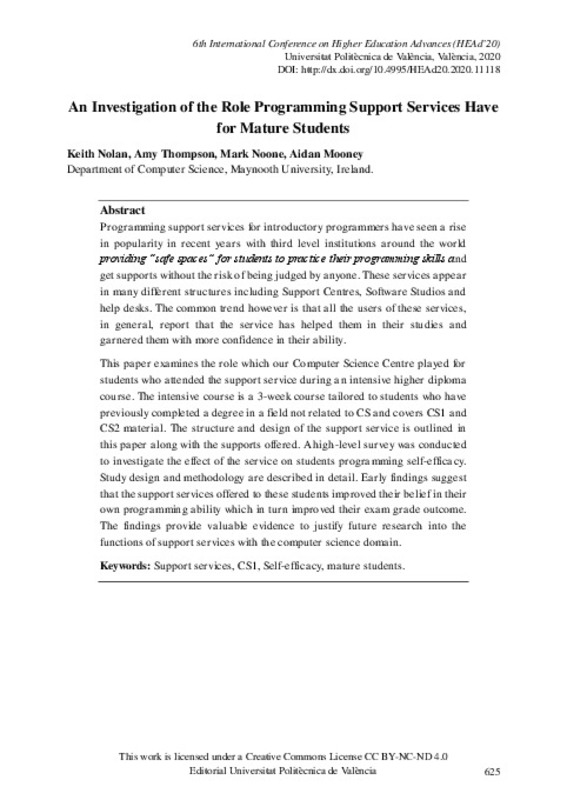JavaScript is disabled for your browser. Some features of this site may not work without it.
Buscar en RiuNet
Listar
Mi cuenta
Estadísticas
Ayuda RiuNet
Admin. UPV
An Investigation of the Role Programming Support Services Have for Mature Students
Mostrar el registro sencillo del ítem
Ficheros en el ítem
| dc.contributor.author | Nolan, Keith
|
es_ES |
| dc.contributor.author | Thompson, Amy
|
es_ES |
| dc.contributor.author | Noone, Mark
|
es_ES |
| dc.contributor.author | Mooney, Aidan
|
es_ES |
| dc.date.accessioned | 2020-06-10T10:19:04Z | |
| dc.date.available | 2020-06-10T10:19:04Z | |
| dc.date.issued | 2020-04-28 | |
| dc.identifier.isbn | 9788490488119 | |
| dc.identifier.issn | 2603-5871 | |
| dc.identifier.uri | http://hdl.handle.net/10251/145936 | |
| dc.description.abstract | [ES] Programming support services for introductory programmers have seen a rise in popularity in recent years with third level institutions around the world providing “safe spaces” for students to practice their programming skills and get supports without the risk of being judged by anyone. These services appear in many different structures including Support Centres, Software Studios and help desks. The common trend however is that all the users of these services, in general, report that the service has helped them in their studies and garnered them with more confidence in their ability. This paper examines the role which our Computer Science Centre played for students who attended the support service during an intensive higher diploma course. The intensive course is a 3-week course tailored to students who have previously completed a degree in a field not related to CS, and covers CS1 and CS2 material. The structure and design of the support service is outlined in this paper along with the supports offered. A high-level survey was conducted to investigate the effect of the service on students programming self-efficacy. Study design and methodology are described in detail. Early findings suggest that the support services offered to these students improved their belief in their own programming ability which in turn improved their exam grade outcome. The findings provide valuable evidence to justify future research into the functions of support services with the computer science domain. | es_ES |
| dc.language | Inglés | es_ES |
| dc.publisher | Editorial Universitat Politècnica de València | es_ES |
| dc.relation.ispartof | 6th International Conference on Higher Education Advances (HEAd'20) | |
| dc.rights | Reconocimiento - No comercial - Sin obra derivada (by-nc-nd) | es_ES |
| dc.subject | Higher Education | es_ES |
| dc.subject | Learning | es_ES |
| dc.subject | Educational systems | es_ES |
| dc.subject | Teaching | es_ES |
| dc.subject | Support services | es_ES |
| dc.subject | CS1 | es_ES |
| dc.subject | Self-efficacy | es_ES |
| dc.subject | Mature students | es_ES |
| dc.title | An Investigation of the Role Programming Support Services Have for Mature Students | es_ES |
| dc.type | Capítulo de libro | es_ES |
| dc.type | Comunicación en congreso | es_ES |
| dc.identifier.doi | 10.4995/HEAd20.2020.11118 | |
| dc.rights.accessRights | Abierto | es_ES |
| dc.description.bibliographicCitation | Nolan, K.; Thompson, A.; Noone, M.; Mooney, A. (2020). An Investigation of the Role Programming Support Services Have for Mature Students. En 6th International Conference on Higher Education Advances (HEAd'20). Editorial Universitat Politècnica de València. (30-05-2020):625-633. https://doi.org/10.4995/HEAd20.2020.11118 | es_ES |
| dc.description.accrualMethod | OCS | es_ES |
| dc.relation.conferencename | Sixth International Conference on Higher Education Advances | es_ES |
| dc.relation.conferencedate | Junio 02-05,2020 | es_ES |
| dc.relation.conferenceplace | València, Spain | es_ES |
| dc.relation.publisherversion | http://ocs.editorial.upv.es/index.php/HEAD/HEAd20/paper/view/11118 | es_ES |
| dc.description.upvformatpinicio | 625 | es_ES |
| dc.description.upvformatpfin | 633 | es_ES |
| dc.type.version | info:eu-repo/semantics/publishedVersion | es_ES |
| dc.description.issue | 30-05-2020 | |
| dc.relation.pasarela | OCS\11118 | es_ES |








